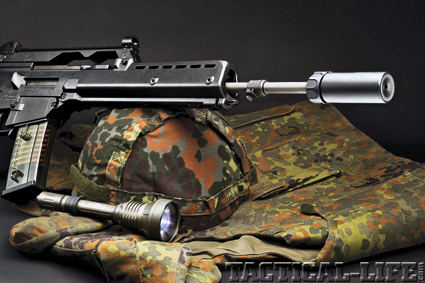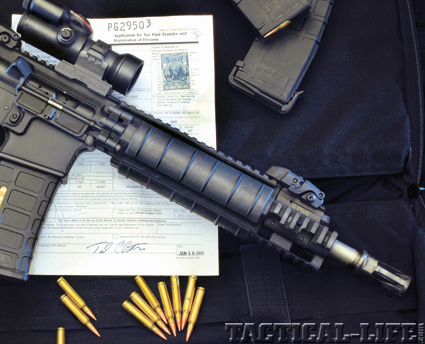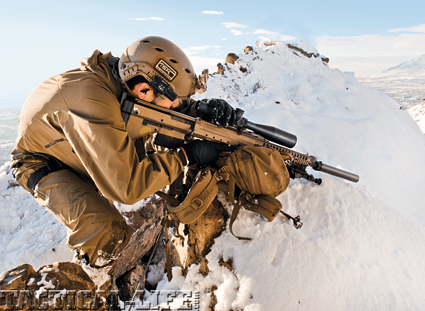https://cdn.athlonoutdoors.com/wp-content/uploads/sites/8/2012/03/nfa-2.jpg
Many weapons parts are federally regulated like SBRs. Keep them safe with NFA trusts. A prevalent misconception exists among the general public, and the majority of gun owners, that silencers are illegal. Lump machine guns and short-barreled rifles into that questionable group, too. To the better informed, all the previously mentioned weapons can be legally owned by paying a $200 tax and filling out ATF Form 5320.4, also referred to as Form 4.
The most common manner in which to obtain restricted Class III weapons is to fill out the Bureau of Alcohol, Tobacco and Firearms (BATF) Form 4 and register the weapon as “individual” ownership. The second classification, “corporations,” allows incorporated entities to own Class III weapons. A third registration method is to assign your ownership to an NFA trust.
NFA Trusts Are a Popular Method to Own NFA Guns
Creating a trust to own Class III weapons has risen in popularity over the past two years, owing to a couple of reasons. As a part of the background check process, the chief law enforcement officer in the community where you live is required to sign off on the Form 4. NFA trusts are a popular option for those communities where that LEO refuses to sign off on the form. The second reason that trusts have become more popular is the belief that Class III applications registering ownership to a trust get approved in less than the two to eight months it has historically taken to get approval.
The popularity of creating a trust to take ownership of Class III weapons deserves a hard look to weigh the pros and cons associated with this choice. Keep in mind that I am not an attorney. For this reason, I am not making any recommendations that could be construed as legal advice. I am merely presenting the views of two knowledgeable attorneys on the subject, as well as other experts on the subject. Going beyond using a trust to own National Firearms Act (NFA) regulated Title 2 weapons, this method of ownership may be used in states where Title 1 weapons come under close personal scrutiny, too. (Title 1 firearms are the kind that you can go to Wal-Mart or the local gun shop to buy.) An attorney in your state should make that judgment, though.
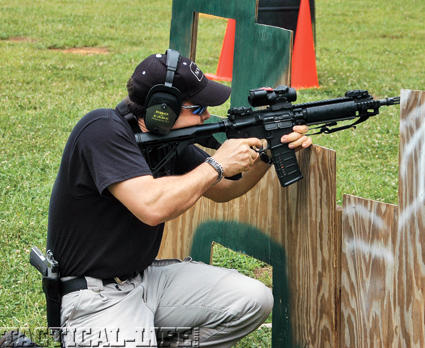
Handy around barricades, short-barreled rifles are excellent competitors in 3-Gun competitions. Photo courtesy Matt Howard
Before diving into the issue of NFA trusts, let’s examine registering weapons under a corporation to help clear the air. Some of the pitfalls of using a corporation instead of a trust include registration of the corporation on an annual basis that require fees from state and local municipalities, filing taxes and maintaining a board of directors. If the corporation is dissolved, dealing with the assets, such as NFA items, can be difficult legally.
Legal Advice on an NFA Trust
A trust is an estate-planning document. A trust lives on beyond the life of the person establishing the trust. To get an idea of the benefits of creating an NFA trust, I spoke with David Goldman, an attorney from Florida. He established GunTrustLawyer.com, and created a network of lawyers who specialize in creating NFA trusts. “The biggest reason that people use trusts is that the chief LEO won’t sign off,” Goldman said. “One of our most frequent users for trusts is police officers—when budgets are tight and the officers want to arm themselves with short-barreled rifles, but their chief won’t sign off. Privacy is another matter.”
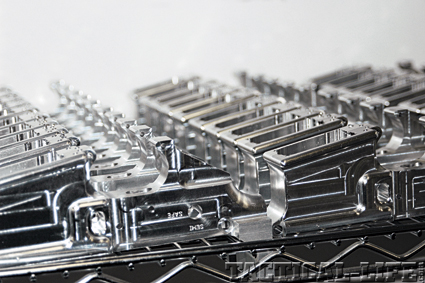
Sun Devil lower. Jeremy Clough photo
I don’t advocate allowing felons to own firearms. Certain legal judgments don’t take into account every case, though. And, with 50 percent of marriages ending in divorce, it complicates some gun ownership situations. “You don’t have to be engaged in criminal activity to be a prohibited person,” Goldman said. “I had a client injure a child in a helicopter accident and was convicted of child endangerment, which made him a ‘prohibited’ person. If his 12 machine guns hadn’t been in a trust, they would have been lost.”
Stories abound of false charges brought by angry spouses embroiled in divorce proceedings. “I had a client throw a cup of water and he was charged with spousal abuse, and became a prohibited person,” Goldman added.
“A person cannot purchase a machine gun without a background check just by using a trust. The gun or firearms trust merely prevents the local CLEO (Chief Law Enforcement Officer) from arbitrarily denying fully qualified individuals the ability to exercise their constitutional right to purchase a firearm. An NFA trust does not make it easier for a criminal to purchase machine guns, silencers, and SBRs because of the ease in which these items can be tracked back to the purchaser.
“Besides allowing individuals to protect their right to purchase firearms, these trusts provide protections for the families and friends of gun owners that are not available with individual ownership. Through the traditional purchase route, many individuals are at risk of criminal activity and prosecution for permitting a friend, spouse, parent or child use or have access to the items. In addition, individual ownership does not deal with important issues, such as incapacity or death of the firearm owner. Likewise, a gun trust addresses the transfer of these firearms to heirs that may not be eligible to receive them, such as children or people living in a state where Title II firearms are not permitted. As a gun trust lawyer, I have seen many individuals who were forming corporations, trusts, and LLCs that were generic in nature and did not address their needs. Due to these errors, they placed their families, friends and children at unnecessary risk—a risk that can be avoided with an adequate NFA gun trust.”
More Aspects
After a long conversation with Mr. Goldman, I related my interest in setting up an NFA trust with fellow writer, shooter and attorney, Jason Wong. A couple months ago, at a camp house in Wyoming, Wong said, “You have to be careful when setting up an NFA trust. I’ve talked to several people who want to take ‘will maker’ software and create a gun trust. There are too many variables in state law to just create a trust in this manner. You run the risk of creating an invalid trust.”
Wong summarized his caution best in a recent article on Tactical-Life.com: “In some jurisdictions, local chief law enforcement officers will refuse to sign the Form 4 certification, and it can be nearly impossible to complete the form,” Wong said. “In these instances, some buyers have resorted to using corporations, limited liability companies, or a trust to avoid the law enforcement certification requirement. When a non-person entity (such as a corporation or trust) is used to purchase NFA firearms, the requirements for a photo and law enforcement certification are waived by the ATF.
“If the buyer is self-employed, he may have already formed a corporation or LLC. In other cases, buyers often form corporations and trusts solely for the purchase of NFA firearms. If a buyer lives within a jurisdiction where a law enforcement certification is difficult or impossible to obtain, he may wish to explore one of these options. Buyers should speak with a lawyer about potential advantages and risks when considering the use of a corporation or a trust. Potential risks include the loss of all firearms possessed by a corporation or trust if the formation and administrative procedures required of the entity are not followed properly.”
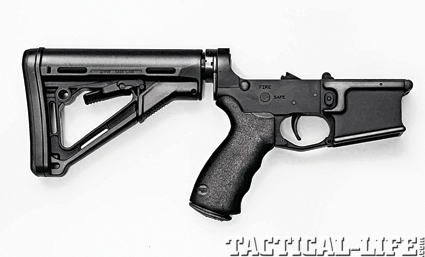
The real difference between a standard lower and one for legal SBRs is the BATFE registration. Jeremy Clough photo
“Depending on the state, it can be as easy as signing a piece of paper and have it witnessed and notarized,” Goldman said in regards to completing a NFA trust. “We participate in the fees for providing the information and federal guidance and the local attorney handles the state issues. It can take 24 hours to turn them around to another attorney, but it usually takes a week.”
Cost of Security
Checking on the cost of establishment, I find it common for estate trusts to run in the $1,500 range. “In most states, we try to find attorneys who will prepare the Gun Trusts for a total of $600,” Goldman said.
“There’s a rumor that trusts take half as long to get approval as individual applications,” John Hollister with Advanced Armament Corporation said. “It’s logical because it takes less time to review since no fingerprints are required. There are only 12 examiners who review NFA applications. On July 1, 2011, the NFA application examiners were reshuffled from categorizing based upon the first letter of the last name of the applicant to being divided by state of applicant.” Hollister went on to speculate that individual Form 4 approval would be faster in the near future, owing to the reorganization of application examiners.
If you are in the market to purchase a silencer, machine gun, short-barreled rifle or other NFA weapon, consider all the options carefully. If you choose to form a trust, ensure that you weigh carefully the do-it-yourself route. I’ll be using a local attorney to set up mine.
The post What Are NFA Trusts? appeared first on Tactical Life Gun Magazine: Gun News and Gun Reviews.
Tactical Life Gun Magazine: Gun News and Gun Reviews
